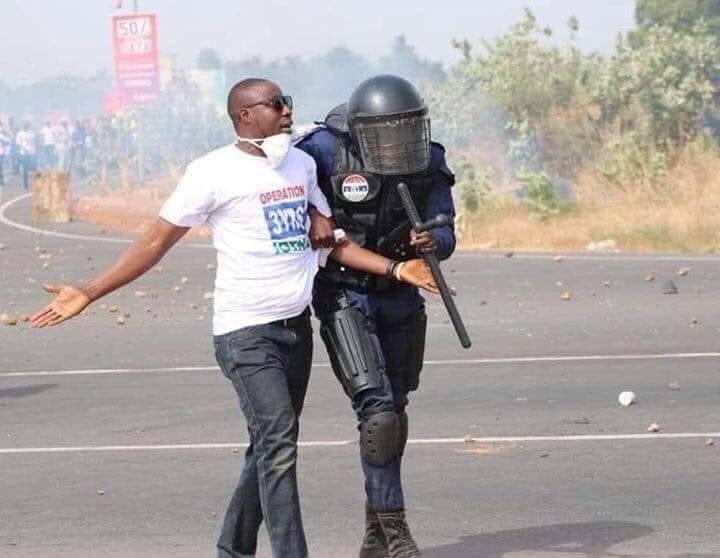
Coalition of Progressive Gambians (CoPG) since August wrote to the police for permit to stage a peaceful protest on November 11.
The protest would be “to demand the president and his government to immediately address the daily price hikes in fuel, food and other essential commodities in the country”.
The police once again, unsurprisingly, refused them the permit based on a flimsy excuse of “security reasons”. What security reason?
The police have no empirical evidence to show that when people are given permit to protest peacefully, it ends up threatening the security of the country.
In fact, the denial of permit to those who want to protest peacefully is even more of a threat to peace than issuing it. When every time people want to protest peacefully are denied to do so, they would eventually have to resort to other means.
In actuality, in The Gambia, the security forces have been the ones responsible for protests descending into chaos. They always provoked it.
All the protests that security forces did not interfere with as in attempt to disperse them, all ended peacefully—even during the times when security concerns should be highest as in Madi Jobarteh and his group staging a protest at the Independence Stadium on February 18, 2017 while Adama Barrow was being sworn in for the first time.
In The Gambia, as should be in any democratic state, there is a right to protest as enshrined in the constitution in Section 25 subsection 1d which states that everyone shall have the right to, (d) freedom to assemble and demonstrate peaceably and without arms.
This is to say peaceful protest is a constitutional as well as a democratic right for all citizens.
Without doubt, if the CoPG had been issued a permit for their planned protest on November 11, it would go on and ends peacefully as long as the Police Intervention Unit (PIU) doesn’t interfere; and would not have gotten all the attention it has now for being denied a permit.
For some reasons, this group got the government really jittery to an extend that their registration with the AG Chambers had to be revoked. The reason being they have seen as a pressure group. What a joke!!
The Gambia, obviously, is not ready for democracy. Protest, pressure groups, etc are but essential parts of democracy.
And looking at the reasons they want to stage a protest for, there appears no threat to national security at all.
Just this past Saturday, November 5, hundreds of Ghanaians protested in Accra calling for the resignation of their president, or he be impeached because of economic hardship.
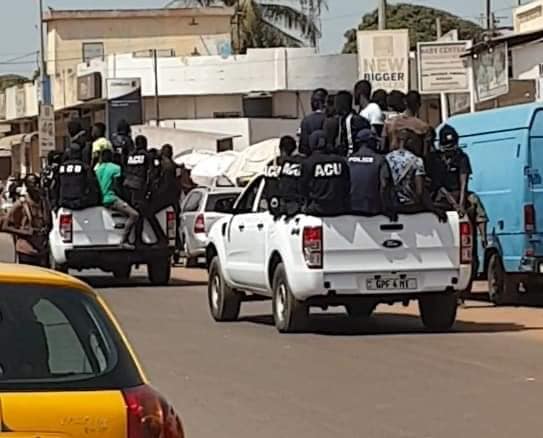
The protesters marched past police in riot gear waving placard and chanting “Akufo-Addo must go”. One can only imagine how a march to call of the resignation of Adama Barrow would be seen by the security forces in The Gambia.
Obviously, Ghanaian security forces are more professional as they are more educated than ours. Most of people in PIU who are sent to ‘control’ the protesters are mostly the less educated and the less intelligent who can be easily manipulated.
One could be right to call them the quintessential ‘sheeples’. They are group that relish inflicting pain on their fellow citizens.
We have all seen the video of two PIU officers laughing with a glee and feeling fulfilled for brutalizing the UDP supporters who gathered at their party leader’s home on Kairaba Avenue two days after the December 2021 presidential election.
Well, may be we shouldn’t be surprised by that as they may have taken that page from President Adama Barrow himself by ridiculing and laughing at how severely the PIU dealt with the 3 years Jotna protesters at a political meeting.
This was a president of a democratic nation taking joy at how ‘his’ security forces descended on, and brutalized protesters who were even issued a permit to stage that very protest. How sad and pathetic! How unreflective.
Adama Barrow’s ascension to the presidency happened on the back of protest, which ever ways one looks at it.
If Solo Sandeng and his colleagues’ protest had ended peacefully, he wouldn’t have been beaten, arrested and tortured to death, which became one of the reasons that galvanised people to vote out Yahya Jammeh.
In another way, if that protest had ended peacefully, Ousainu Darboe and the UDP leadership wouldn’t have come out, let alone to be brutalized, arrested and put in jail for Adama Barrow to be selected as a UDP candidate, let alone to be chosen as the Coalition candidate to win the election to become president.
As previously stated, going by the trend from the beginning of the second republic (the current one), protests on their own have always been peaceful, including those that were staged without police permit.
The only times they had become chaotic or ended in violence was when members of security forces showed up to disperse or disrupt them.
On October 7, 2022, dozens of people gathered at the Youth Monument at Westfield and lit candles calling for justice for the 66 young Gambians, at the time, who lost their lives due acute kidney injuries. That protest ended peacefully.
When UDP supporters gathered at Ousainu Darboe’s compound at Kairaba Avenue on December 6, 2021 after the presidential elections; they would have eventually dispersed peacefully had the PIU not attacked and threw tear gas at them, brutalizing some of them.
In July 2019, if the trigger happy, PIU officers had not attacked and fired tear gas at the protesters demanding better service delivery from the Brikama Area Council; resulting to over 25 people being hospitalized, that protest would have ended peacefully.
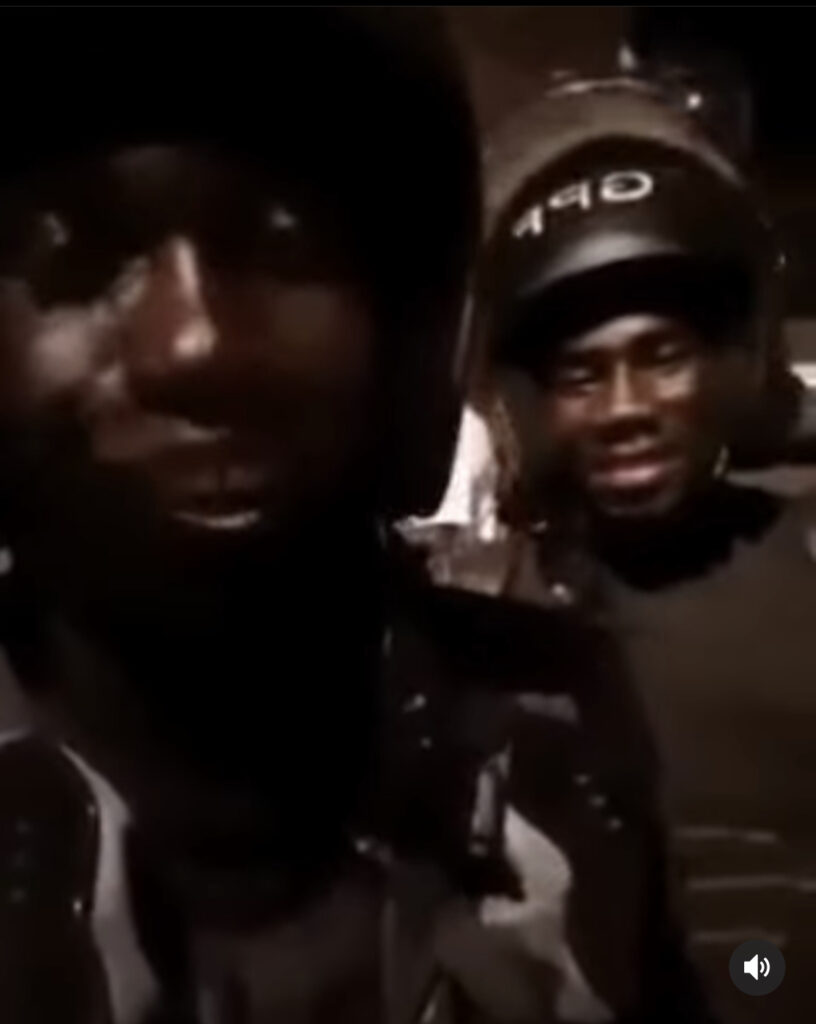
All the protesters were asking for was better service from the people they paid their taxes to. They would have marched to BAC and deliver their petition and disperse peacefully.
Obviously if they had been issued permit in the first place, the situation would have descended to chaos.
In December 2019, the 3 Years Jotna conducted their first protest. Despite the awkwardness of the venue given to them, thousands attended. They marched peacefully and handed over their petition to a government representative and dispersed.
On January 27, 2020, after being given a permit; and being subjected to a more stringent conditions as in a different venue and a 3-hour protest duration, thousands turned out yet again.
Had the PIU not descended on them and brutalised them, more than likely, that protest too would have ended peacefully.
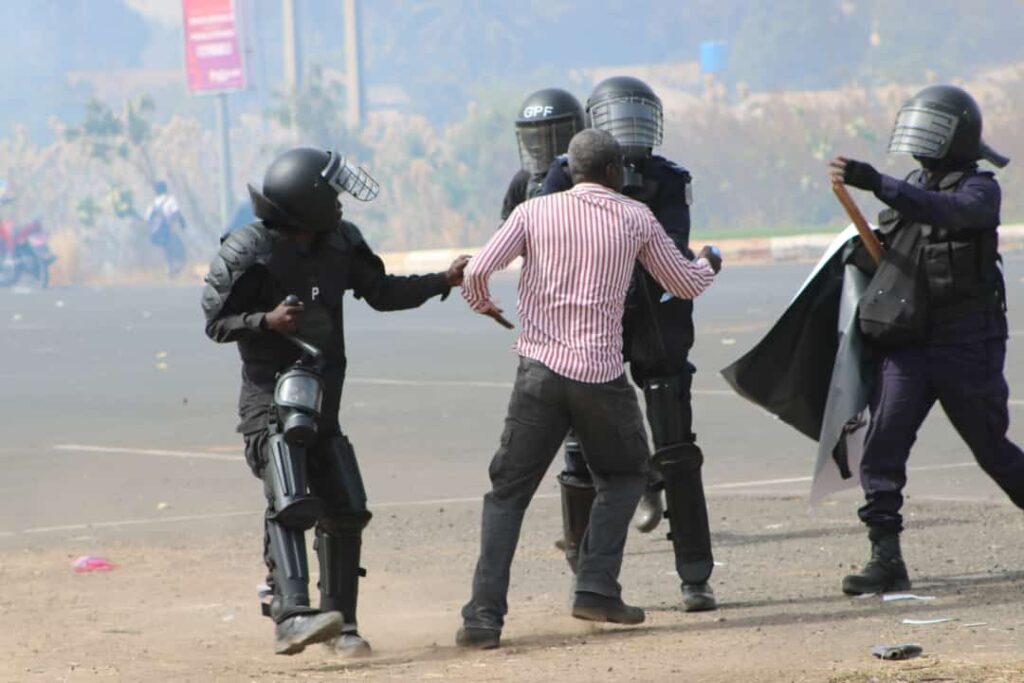
On January 25, 2020, hundreds of Gambians took part in the “Jammeh To Justice” march organised by the Gambia Centre For Victims of Human Rights Violation from Westfield to Alliance Franco on the Kairaba Avenue calling for justice over Yahya Jammeh’s human rights abuses including forced disappearances, rape, and murder which occurred during his 22-year rule. That marched went on peacefully because the protesters have not been provoked or attacked by security forces.
Mid-April 2018, a squabble broke out between the security personnel and members of the Gambia Center For Victims of Human Rights Violations at the Arch of Banjul (Arch 22) when the security personnel attempted to disrupt their march from the Arch to the High Court. The march later went ahead and ended peacefully.
On June 18, 2018, in Faraba, chaos erupted and hell broke loose when the members of PIU violently disrupted a peaceful protest by the villagers against sand mining in their village.
Live bullets were used by the security personnel resulting in the killing of three young protesters, and a number of injuries. Had the PIU not attempted to disrupt that protest, it would have ended much more peacefully.
In Kanilai in June 2017, a protest against the military installation in the village ended violently with the killing of Haruna Jatta because of a confrontation between members of the security forces and the protesters.
On February 18, 2017, Madi Jobarteh and his colleagues staged a protest at the Independence Stadium at the same time Adama Barrow was being sworn in for the first time at the same venue.
That protest passed off peacefully as the security personnel, even though they saw the protesters, never made any attempt to disrupt the march.
There couldn’t have been a more serious threat to national security of the nation than that time if peaceful protests are indeed a security threat. This was just after the impasse.
In April 2016, Solo Sandeng and his colleagues marched peacefully as a form of protest for electoral reform all the way from Bambo till Westfield without a hitch.
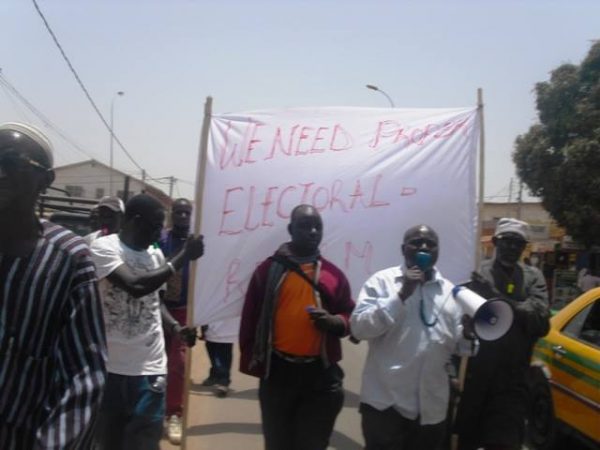
It was when the members of PIU showed up to beat and arrest them that things turned for the worst. They were taken to NIA headquarters in Banjul where they were further tortured which eventually led to the death of Solo Sandeng.
Ousainou Darboe, as the leader of UDP, with his party leadership embarked on a peaceful march, two days later, to demand for the body of Solo Sandeng, death or alive. Their protest was all peaceful until when the security personnel showed up.
November 2015, a peaceful protest in Kartong against sand mining went haywire when the security personnel showed up to disrupt the march.
In December 2004, a protest by the Gambia media fraternity against the murder of their colleague, Deyda Hydara, passed off peacefully as no attempt was made by security personnel to disrupt the protest. If organisers never sought permit to embark on that march.
In April 2000, students’ planned demonstration against the rape and the killing of their colleagues ended up in the massacre of 14 students and injury cum maiming of many more students when the members of the security force showed up to disperse them forcefully.
So, from the above, one can see that peaceful protests became chaotic or ended up violently only when the members of the security services attempted to disrupt them by force. The ones they never interfered with, went off peacefully.
Peaceful protests should be seen for what they are in a democratic state; which is a way of citizens exercising their rights to show their disagreement, disapproval or objection peacefully.
One may not agree with the reasons, or even necessarily understand why a specific protest is being done, but that doesn’t mean it must not go ahead.
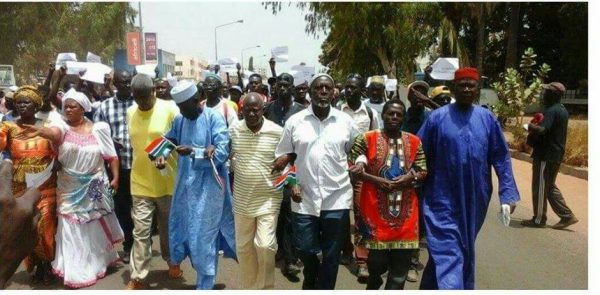
And for those saying that November 11 will not be a good time to protest because of the tourist season. Are they for real? So, when will be the right time to protest?
The journalists who protested against the killing of Deyda Hydara did that six days after he was shot to death. Was that the right time?
How about the timings of Solo Sandeng’s and UDP’s leadership’s protests? Was Madi and his colleagues’ protest whilst Barrow was being sworn in done at the wrong time?
By Maa Touray










Recent Comments